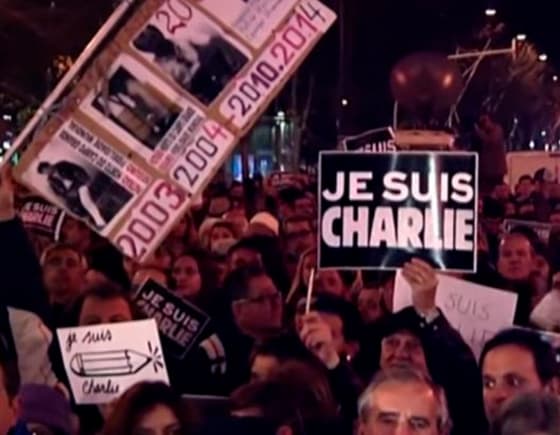When the offices of satirical French weekly Charlie Hebdo were attacked in the first week of 2015, it was impossible to tell if it was the culmination of a variety of factors or a preview of things to come.
The shooters were Chérif and Saïd Kouachi, two brothers from Yemen who pledged allegiance to Al-Qaeda and claimed they were incensed over what they felt were blasphemous caricatures in the magazine; Three Days of Terror: The Charlie Hebdo Attacks, an hour-long documentary directed by Dan Reed and premiering on HBO this month, is about the violence they enacted in the Charlie Hebdo office.
The documentary is constructed from extensive interviews with those survivors of the office attacks, as well as footage obtained from various local media outlets. Some of the tensest excerpts emerge from a mobile wielded atop the building, capturing the Kouachi brothers yelling "We have avenged the prophet Mohammed!" on the street after shooting a police officer. It's difficult not to have a visceral reaction to images of such acts, but Reed refrains from directing the audience toward any specific emotional conclusion.
While the attack on the Charlie Hebdo office is the primary focus of the first two-thirds of the film, the final act documents the lesser-known attacks of a lone gunman. A young man named Amedy Coulibaly was reported as having shot both a civilian and a police officer in Paris on January 8 and 9 before taking a dozen people hostage at a kosher supermarket in the Porte de Vincennes section of Paris on January 9. In videos and recordings made before and during the rampage, Coulibaly attempted to insert himself into the Charlie Hebdo narrative, stating at various points in the film: "They attacked Charlie Hebdo…while I took on the police. We acted kind of together, kind of separately…to have more impact."
Director Dan Reed is something of a seasoned veteran of presenting matters of violence to viewers, having helmed 2014's Terror at the Mall, which also documented an Al-Qaeda-related killing spree, and as documentation of a violent and public event, Three Days of Terror is effective. The primary limitation of the film comes simply from formatting: with only an hour to tell the story, all the audience really receives is a basic retelling of the facts.
Yet the retelling is still plenty worth a watch, mostly due to the thorough documentation and interviews related to the events. The candidness of the interviewees in particular cannot be denied, particularly when one survivor speaks of saving people in his dreams but being incapable of action when faced with a real threat. The personal and still-raw insight from the survivors helps keep the film from attempting political discourse. Reed doesn't lean in any one direction; Three Days of Terror: The Charlie Hebdo Attacks merely sketches the growing tension between extremists and the rest of the world, and does it poignantly.
(HBO)The shooters were Chérif and Saïd Kouachi, two brothers from Yemen who pledged allegiance to Al-Qaeda and claimed they were incensed over what they felt were blasphemous caricatures in the magazine; Three Days of Terror: The Charlie Hebdo Attacks, an hour-long documentary directed by Dan Reed and premiering on HBO this month, is about the violence they enacted in the Charlie Hebdo office.
The documentary is constructed from extensive interviews with those survivors of the office attacks, as well as footage obtained from various local media outlets. Some of the tensest excerpts emerge from a mobile wielded atop the building, capturing the Kouachi brothers yelling "We have avenged the prophet Mohammed!" on the street after shooting a police officer. It's difficult not to have a visceral reaction to images of such acts, but Reed refrains from directing the audience toward any specific emotional conclusion.
While the attack on the Charlie Hebdo office is the primary focus of the first two-thirds of the film, the final act documents the lesser-known attacks of a lone gunman. A young man named Amedy Coulibaly was reported as having shot both a civilian and a police officer in Paris on January 8 and 9 before taking a dozen people hostage at a kosher supermarket in the Porte de Vincennes section of Paris on January 9. In videos and recordings made before and during the rampage, Coulibaly attempted to insert himself into the Charlie Hebdo narrative, stating at various points in the film: "They attacked Charlie Hebdo…while I took on the police. We acted kind of together, kind of separately…to have more impact."
Director Dan Reed is something of a seasoned veteran of presenting matters of violence to viewers, having helmed 2014's Terror at the Mall, which also documented an Al-Qaeda-related killing spree, and as documentation of a violent and public event, Three Days of Terror is effective. The primary limitation of the film comes simply from formatting: with only an hour to tell the story, all the audience really receives is a basic retelling of the facts.
Yet the retelling is still plenty worth a watch, mostly due to the thorough documentation and interviews related to the events. The candidness of the interviewees in particular cannot be denied, particularly when one survivor speaks of saving people in his dreams but being incapable of action when faced with a real threat. The personal and still-raw insight from the survivors helps keep the film from attempting political discourse. Reed doesn't lean in any one direction; Three Days of Terror: The Charlie Hebdo Attacks merely sketches the growing tension between extremists and the rest of the world, and does it poignantly.
